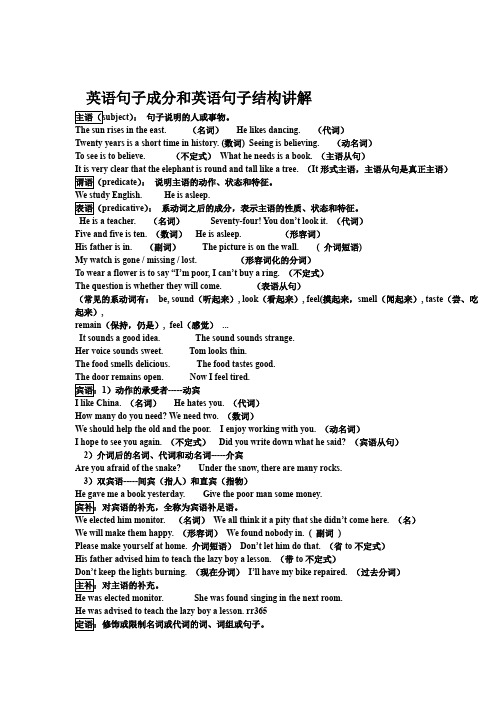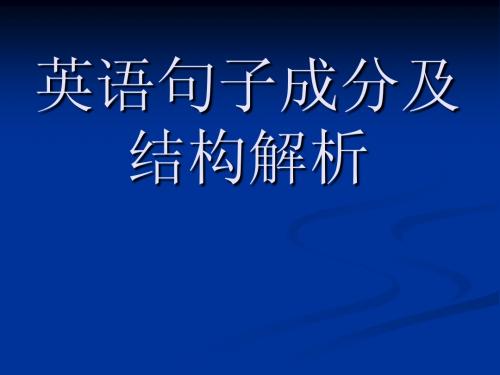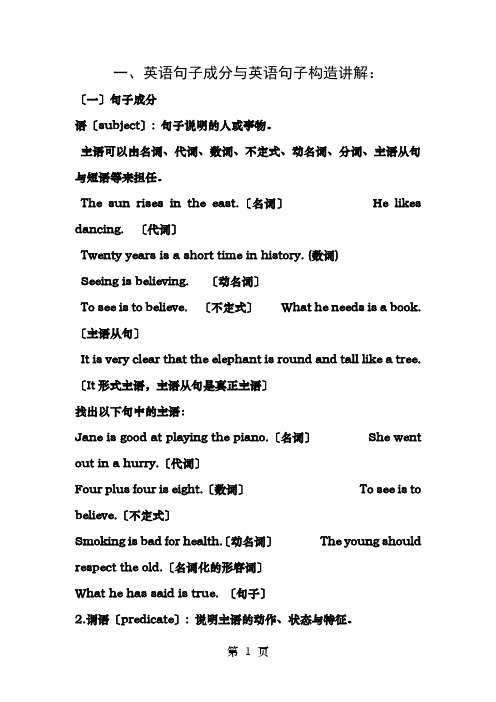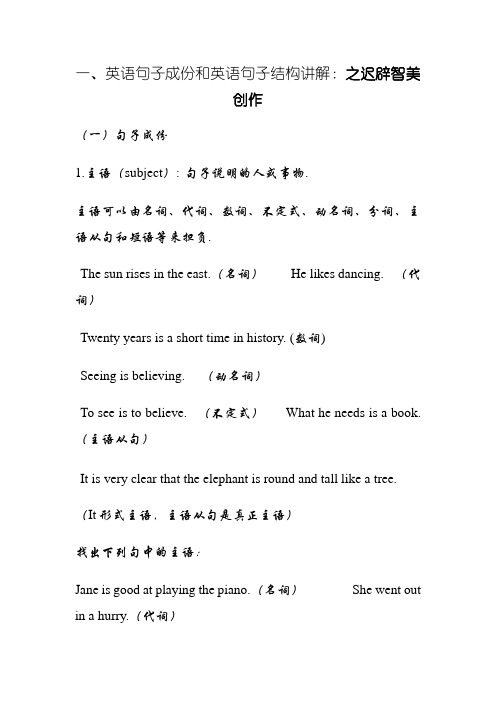英语句子成分及基本结构解析
英语句子成分和英语句子结构讲解

英语句子成分和英语句子结构讲解):句子说明的人或事物。
The sun rises in the east. (名词)He likes dancing. (代词)Twenty years is a short time in history. (数词) Seeing is believing. (动名词)To see is to believe. (不定式)What he needs is a book.(主语从句)(It形式主语,主语从句是真正主语)predicate):说明主语的动作、状态和特征。
He is asleep.predicative):系动词之后的成分,表示主语的性质、状态和特征。
He is a teacher. (名词) Seventy-four! You don’t look it.(代词)Five and five is ten.(数词) He is asleep. (形容词)His father is in. (副词)The picture is on the wall. (介词短语)My watch is gone / missing / lost. (形容词化的分词)To wear a flower is to say“I’m poor, I can’t buy a ring.(不定式)The question is whether they will come. (表语从句)(常见的系动词有:be, sound(听起来), look(看起来), feel(摸起来,smell(闻起来), taste(尝、吃起来),remain(保持,仍是), feel(感觉)...It sounds a good idea. The sound sounds strange.Her voice sounds sweet. Tom looks thin.The food smells delicious. The food tastes good.1)动作的承受者-----动宾I like China.(名词)He hates you.(代词)How many do you need? We need two.(数词)We should help the old and the poor. I enjoy working with you. (动名词)I hope to see you again. (不定式)Did you write down what he said?(宾语从句)2)介词后的名词、代词和动名词-----介宾Are you afraid of the snake? Under the snow, there are many rocks.3)双宾语-----间宾(指人)和直宾(指物)Give the poor man some money.We elected him monitor. (名词) We all think it a pity that she didn’t come here.(名)We will make them happy.(形容词)We found nobody in. (副词)Please make yourself at home.介词短语)Don’t let him do that.(省to不定式)His father advised him to teach the lazy boy a lesson.(带to不定式)(现在分词)I’ll have my bike repaired.(过去分词)He was elected monitor. She was found singing in the next room.Ai Y anling is a chemistry teacher.(名词) He is our friend.(代词)We belong to the third world. (数词) He was advised to teach the lazy boy a lesson.(形容词)The man over there is my old friend.(副词) The woman with a baby in her arms is my sister. (介词)The boys playing football are in Class 2. (现在分词)The trees planted last year are growing well now.(过去分词)I have an idea to do it well. (不定式)(定语从句)v., adj., adv., or句子。
英语句子成分及结构解析

1. The war was over. 2. They seem to know the truth. 3. Time is precious. 4. I’m not quite myself today. 5. Who was the first? 6. He is out of condition. 7. The book is what I need.
第一种:S+V 第一种: 主语+谓语动词) (主语+谓语动词) 第二种: 第二种:S+V+O 主语+谓语动词+宾语) (主语+谓语动词+宾语) 第三种: 第三种:S+V+P 主语+连系动词+表语) (主语+连系动词+表语) 第四种: 第四种:S+V+InO+DO 主语+及物动词+间接宾语+直接宾语) (主语+及物动词+间接宾语+直接宾语) 第五种: 第五种:S+V+O+OC 主语+及物动词+宾语+宾语补语) (主语+及物动词+宾语+宾语补语)
(8)状语 (8)状语
用于修饰形容词,副词,动词, 用于修饰形容词,副词,动词,介词短语或 句子.可表示时间,地点,原因,结果,目的, 句子.可表示时间,地点,原因,结果,目的, 方式,伴随,条件,程度,让步,频率等. 方式,伴随,条件,程度,让步,频率等. I will be back in a while. They are playing on the playground. He was late because he got up late. He got up so late that I missed the train.
英语句子成分和句型结构

一、英语句子成分与英语句子构造讲解:〔一〕句子成分语〔subject〕: 句子说明的人或事物。
主语可以由名词、代词、数词、不定式、动名词、分词、主语从句与短语等来担任。
The sun rises in the east.〔名词〕He likes dancing. 〔代词〕Twenty years is a short time in history. (数词)Seeing is believing. 〔动名词〕To see is to believe. 〔不定式〕What he needs is a book. 〔主语从句〕It is very clear that the elephant is round and tall like a tree. 〔It形式主语,主语从句是真正主语〕找出以下句中的主语:Jane is good at playing the piano.〔名词〕She went out in a hurry.〔代词〕Four plus four is eight.〔数词〕To see is to believe.〔不定式〕Smoking is bad for health.〔动名词〕The young should respect the old.〔名词化的形容词〕What he has said is true. 〔句子〕2.谓语〔predicate〕: 说明主语的动作、状态与特征。
简单谓语:由动词或动词词组组成I saw the flag on the top of the hillHe looked after two orphans.复合谓语:由情态动词或助动词+动词;He can speak English well.She doesn’t seem to like dancing.找出以下句中的谓语〔注:只有动词才可作谓语。
〕:1. We love China.2. We have finished reading this book.3. He can speak English.4. She seems tired.语〔predicative〕: 系动词之后的成分,表示主语的性质、状态与特征。
英语句子成分和英语句子结构讲解

一、英语句子成份和英语句子结构讲解:之迟辟智美创作(一)句子成份1.主语(subject): 句子说明的人或事物.主语可以由名词、代词、数词、不定式、动名词、分词、主语从句和短语等来担负.The sun rises in the east.(名词)He likes dancing. (代词)Twenty years is a short time in history. (数词)Seeing is believing. (动名词)To see is to believe. (不定式)What he needs is a book. (主语从句)It is very clear that the elephant is round and tall like a tree.(It形式主语,主语从句是真正主语)找出下列句中的主语:Jane is good at playing the piano.(名词)She went out in a hurry.(代词)Four plus four is eight.(数词)To see is to believe.(不定式)Smoking is bad for health.(动名词)The young should respect the old.(名词化的形容词)What he has said is true. (句子)2.谓语(predicate): 说明主语的举措、状态和特征.简单谓语:由动词或动词词组组成I saw the flag on the top of the hill?He looked after two orphans.复合谓语:由情态动词或助动词+动词;He can speak English well.She doesn’t seem to like dancing.找出下列句中的谓语(注:只有动词才可作谓语.):1. We love China.2. We have finished reading this book.3. He can speak English.4. She seems tired.3.表语(predicative): 系动词之后的成份,暗示主语的性质、状态和特征.He is a teacher. (名词)Seventy-four! You don’t look it. (代词)Five and five is ten. (数词)He is asleep. (形容词)His father is in. (副词)The picture is on the wall. ( 介词短语)My watch is gone / missing / lost. (形容词化的分词)To w ear a flower is to say “I’m poor, I can’t buy a ring. (不定式)The question is whether they will come. (表语从句)★(罕见的系动词有: be, sound(听起来), look(看起来), feel(摸起来,smell(闻起来),taste(尝、吃起来), remain(坚持,仍是), feel(感觉) ... It sounds a good idea. The sound sounds strange. Her voice sounds sweet. Tom looks thin.The food smells delicious. The food tastes good.The door remains open. Now I feel tired.找出下列句中的表语.1. I am a teacher.2. They are on the playground.3. My job is teaching English.4. It gets cold.5. It sounds interesting.4.宾语:1)举措的接受者-----及物动词或介词的宾语I like China. (名词)He hates you. (代词)How many do you need? We need two. (数词)We should help the old and the poor. I enjoy working with you. (动名词)I hope to see you again. (不定式)Did you write down what he said? (宾语从句)2)介词后的名词、代词和动名词-----介宾Are you afraid of the snake? Under the snow, there are many rocks.3)双宾语-----间宾(指人)和直宾(指物)宾语分为直接宾语和间接宾语.直接宾语指物或事,间接宾语指人或植物.He gave me a book yesterday. Give the poor man somemoney.指出下面句子的间接宾语和直接宾语:please pass me the book.He bought his girlfriend some flowers.找出下列句子的宾语部份:1. We often help him.2. He likes to play basketball.3. We enjoy listening to the music.4. She said that he felt sick.5. They are talking about the new student.5.宾补:对宾语的弥补,全称为宾语补足语.有些及物动词除有一个直接宾语以外,还要有一个宾语补足语,说明宾语的身份和状态以弥补其意义缺乏,使句子的意义完整.这类经常使用的及物动词有:We elected him monitor. (名词)We all think it a pity that she didn’tcome here. (名)We will make them happy. (形容词)We found nobody in. ( 副词)Please make yourself at home. 介词短语)Don’t let him do that. (省to不定式)His father advised him to teach the lazy boy a lesson. (带to不定式)Don’t keep the lights burning. (现在分词)I’ll have my bike repaired. (过去分词)6.主补:对主语的弥补,全称为主语补足语.He was elected monitor. She was found singing in the next room.He was advised to teach the lazy boy a lesson.7.定语:修饰或限制名词或代词的词、词组或句子.Ai Yanling is a chemistry teacher.(名词)He is our friend. (代词)We belong to the third world. (数词)He was advised to teach the lazy boy a lesson.(形容词)The man over there is my old friend.(副词)The woman with a baby in her arms is my sister. (介词)The boys playing football are in Class 2. (现在分词)The trees planted last year are growing well now. (过去分词)I have an idea to do it well. (不定式)You should do everything that I do. (定语从句)定语后置:如果定语是由一个单词暗示时,通常要前置.而由一个词组或一个句子暗示时,通常则后置The girl in red is his sister.We have a lot of work to do.The girl standing under the tree is his daughter.Do you know the man who spoke just now?8.状语:用来修饰v., adj., adv., 或句子.暗示时间、地址、原因、结果、水平、条件、方式和让步. (以下例句按上述顺序排列)I will go there tomorrow.The meeting will be held in the meeting-room.The meat went bad because of the hot weather.He studies hard to learn English well.He didn’t stu dy hard so that he failed in the exam. I like some of you very much.If you study hard, you will pass the exam. He goes to school by bike.Though he is young, he can do it well.(二)句子结构简单句的五个基本句型1.主语+不及物动词She came./ My head aches.2.主语+及物动词+宾语She likes English.3.主语+系动词+表语She is happy.4.主语+双宾动词+间接宾语+直接宾语She gave John a book.5.主语+宾补动词+宾语+宾语补语She makes her mother angry.The teacher asked me to read the passage.★There +be 句型There are some books on the desk.There lies a book on the desk.Exercises :分析下列句子成份1. Our school is not far from my home.2. It is a great pleasure to talk with you3. All of us considered him honest.4. My grandfather bought me a pair of sports shoes.5. He broke a piece of glass.6. He made it clear that he would leave the city.翻译练习:主谓结构(主语+不及物动词)1、你应该努力学习You should study hard.2、他昨天晚上很晚回家She went home very late yesterday evening.练习:1、This box weighs five kilos. 这个盒子重五公斤.2、I lived in Beijing five years ago. 五年前我住在北京.主谓宾结构(主语+及物动词+宾语)1、我昨晚写了一封信I wrote a letter last night.2、我今天下午想和你谈谈I want to talk with you this afternoon.练习:1、All of us believe that Jack is an honest boy. 我们年夜家都相信Jack 是一个诚笃男孩.2、He did not know what to say. 他不知道说什麽好.主系表结构(主语+系动词+表语)1.我的弟弟都是年夜学生My brothers are all college students.2.在冬季,白天很短夜晚很长In winter, the days are short and the nights are long.3. 布朗女士看上去很健康Mrs Brown looks very healthy.4.在他15岁那年他成了著名的画家At the age of fifteen he became a famous pianist.练习:1、树叶已经变黄了.The leaves have turned yellow.2、这个陈说听起来很有意思.The report sounds interesting.双宾语结构(主语+双宾动词+间接宾语+直接宾语)1.强森先生去年叫我们德语Mr Johnson taught us German last year.2.祖父昨晚给我讲了一个有趣的故事Grandma told me an interesting story last night.练习:1、请你给我弄一本新的,好吗?Will you please get me a new copy?2、我替你叫辆出租汽车好吗?Shall I call you a taxi?复合宾语结构(主语+动词+宾语+宾语补足语)1.我们叫她爱丽丝We call her Alice.2.他父母叫他约翰His parents named him John.练习:1、学校定了一条规则,开始上课时学生要起立.The school made it a rule that the students should stand up when class begins.2、我认为与那个人谈话是无益的.I thought it no use talking with that manThere be 句型1.今晚不会开会There isn’t going to be a meeting tonight.2.这个村落里只有一口井There was only a well in the village.练习:1、铃响了.There goes the bell2、一周有七天.There are seven days a week二、英语句子种类讲解:依照句子的用途,英语句子可分为陈说句、疑问句、祈使句和感叹句.依照句子的结构,英语句子可分为简单句、并列句和复合句.中考对句子的考查主要集中在以下几个方面:1. 陈说句的构成形式及基本用法;2. 祈使句的构成形式及基本用法;3. 一般疑问句、特殊疑问句、选择疑问句、反意疑问句的构成形式及基本用法;4. 由what, how引导的感叹句的构成形式、用法及区别对各种从句的用法我们在后面分别论述.(一.) 陈说句的构成形式及基本用法1. 陈说句:陈说句是用来陈说一个事实或表达说话人看法(包括肯定和否定)的句子.通经常使用降调,句末用句号“.”. Tom has a new car.The flower isn’t beautiful.2. 陈说句否定式的构成(1) 如果肯定陈说句的谓语部份含有助动词、情态动词或连系动词be,则只需在这些动词后加not即可构成否定式.He is playing the guitar.(肯定)He is not playing the guitar.(否定)We can get there before dark.(肯定)We can’t get thee before dark.(否定)(2) 如果陈说句的谓语动词是实义动词,而其中又没有情态动词或助动词时,则需根据人称和时态在该实义动词前加don’t, doesn’t或didn’t.同时把该实义动词酿成原形.He plays the violin well.(肯定)He doesn’t play the violin well.(否定)She won the game.(肯定)She didn’t win the game.(否定)(3) 如果句子是there be结构或谓语动词是have(有),除be和have之后加not之外,句中如果有some要酿成any.例如:There is some water in the cup. →There is not any water in the cup.He has some books. →He has not any books.(4) 除not以外,否定词no, never, nothing, nobody, few等也可构成否定句.例如:There is something wrong with his bike. →There is nothing wrong with his bike.I have seen the film. →I have never seen the film.(二.) 祈使句的构成形式及基本用法祈使句是用来暗示命令、请求、建议、号召等的句子,谓语动词用原形,句末用感叹号“!”或句号“.”.朗读时一般用降调.1.肯定的祈使句:(1)祈使句主语是you时,you常省略,但如果要特别强调对方或表达某种强烈的情绪时可以有主语或称号语.Be quiet.You be quiet!(2)“Do+祈使句”暗示一种强烈的感情或请求,do起强调作用.Do come back at once! Do be careful.(3)please用在祈使句中可以暗示一种客气的语气,但please 用在句末时,必需用逗号与其余部份分开.Open the window, please.(4)Let引导祈使句时,后面需跟上人称代词或称号语,人称代词一般只用第一、第三人称.Let Jack wait a minute.Let’s go to school.(5)在祈使句中,Let’s和Let us是有区另外.Let’s包括说话者,而Let us不包括听话者在内.这点从反意疑问句时可明显看出.Let’s go skating, shall we?(暗示内部的建议)Let us try again, will you?(暗示向他人发出请求)2. 否定祈使句通常以Don’t或Never开头.其结构通常是:“Don’t(Never)+动词原形+其他成份” 例如:Don’t do that again!Never leave today’s work for tomorrow! Don’t be late next time!(三.) 一般疑问句、特殊疑问句、选择疑问句、反意疑问句的构成形式及基本用法1. 一般疑问句:(1)一般疑问句的肯定形式一般疑问句一般是指以助动词、情态动词、be动词或have (有)开始,通常要求以yes,或no来回答的疑问句,一般疑问句读时通经常使用升调.Do you know Mr. Smith Can you swim?(2)一般疑问句的否定结构①在一般疑问句的否定结构中,把副词not放在一般疑问句的主语之后.但如果用not的简略形式-n’t,则须将-n’t与一般疑问句句首的be, have,助动词或情态动词写在一起.在实际运用中,一般都采纳简略式.Are you not a football fan?Aren’t you a football fan?Will she not like it?Won’t she like it?②与汉语分歧的是,英语一般疑问句否定结构的答语是否定还是肯定,全由答语的否定或肯定来决定.若答语是肯定的,则用yes加肯定结构;若答语是否定的,则用no加否定结构.Aren’t you a football fan? 你不是足球迷吗?Yes, I am.\ No, I am not.Won’t she like it?Yes, she will. \ No, she won’t.。
英语句子成分分析法结构解析

英语句子成分分析法结构解析很多同学对英语的句子成分搞不懂,所以就影响了他们的阅读和写作,以及做其他类型题目的能力。
今天店铺为大家带来了英语句子成分分析,欢迎大家阅读!英语句子成分分析篇一一、句子成分(一)句子成分的定义:构成句子的各个部分叫做句子成分。
句子成分有主要成分和次要成分;主要成分有主语和谓语;次要成分有表语、宾语、定语、状语、补足语和同位语。
(二)主语:主语是一个句子所叙述的主体,一般位于句首。
但在there be结构、疑问句(当主语不疑问词时)和倒装句中,主语位于谓语、助动词或情态动词后面。
主语可由名词、代词、数词、不定式、动名词、名词化的形容词和主语从句等表示。
例:划出下列句子的主语,并在括号内写出它的词性或充当的是什么从句。
1. During the 1990s, American country music has become more and more popular.( )2. We often speak English in class.( )3. One-third of the students in this class are girls.( )4. To swim in the river is a great pleasure.( )5. Smoking does harm to the health.( )6. The rich should help the poor.( )7. When we are going to have an English test has not been decided.( )8. It is necessary to master a foreign language.( )(三)谓语:谓语说明主语所做的动作或具有的特征和状态。
动词在句中作谓语,一般放在主语之后。
谓语的构成如下:1、简单谓语:由一个动词或动词短语构成。
英语句子成分和英语句子结构讲解

英语句子成分和英语句子结构讲义黑马英语工作室蔡老师1. 主语(subject): 句子说明的人或事物。
The sun rises in the east. (名词)He likes dancing. (代词)Twenty year s is a short time in history. (数词) Seeing is believing. (动名词)To see is to believe. (不定式)What he needs is a book. (主语从句)It is very clear that the elephant is round and tall like a tree.(It形式主语,主语从句是真正主语)2. 谓语(predicate): 说明主语的动作、状态和特征。
We study English. He is asleep.3. 表语(predicative): 系动词之后的成分,表示主语的性质、状态和特征。
He is a teacher. (名词)The book is mine .(代词)Five and five is ten. (数词)He is asleep.(形容词)His father is in. /here(副词)The picture is on the wall.( 介词短语)My watch is gone / missing / lost. (形容词化的分词)To wear a flower is to say “I’m poor, I can’t buy a ring.(不定式)The question is whether they will come. (表语从句)(常见的系动词有: be, sound(听起来), look(看起来), feel(摸起来,smell(闻起来), taste (尝、吃起来), remain(保持,仍是), feel(感觉)...It sounds a good idea.The sound sounds strangeHer voice sounds sweet. Tom looks thin.The food smells delicious. The food tastes good.The door remains open. Now I feel tired.4.宾语:1)动作的承受者-----动宾I like China.(名词)He hates you. (代词)How many do you need? We need two.(数词)We should help the old and the poor. The +形容词I enjoy working with you.(动名词)I hope to see you again. (不定式)Did you write down what he said? (宾语从句)2)介词后的名词、代词和动名词-----介宾Are you afraid of the snake?Under the snow, there are many rocks.3)双宾语-----间宾(指人)和直宾(指物)He gave me a book yesterday.Give the poor man some money.5. 宾补:对宾语的补充,全称为宾语补足语。
高中句子成分详细讲解及基本句型结构
英语句子成分详解一、英语句子的成分组成句子的各个部分叫作句子的成分。
句子成分主要包括主语、谓语、宾语、表语、宾语补足语、定语和状语。
主语和谓语是句子的主体部分。
1)主语subject主语是一个句子的主体,是全句叙述的对象,是句子要说明的人或事物,即表示句子所说的“是什么”或“是谁”,常由名词、代词、动名词或动词不定式等担任,一般位于句首。
The girl can sing many English songs.We are students. / This is my pen. Y ours is on the desk.The blind need more help.To speak loudly in public is not polite.Smoking is bad for your health.2)谓语predicate谓语是对主语加以陈述,表示主语的动作或状态,常由动词担任,一般位于主语之后。
谓语有时态和语态的变化,且要和主语在人称和数上保持一致。
I love you. Y ou hate me. Y ou hurt my heart.I have an English-Chinese dictionary. He has one too.We can play the piano.She is talking with her sister. / I have seen this man before.3)宾语object宾语是谓语动词所涉及的对象,是谓语动词所表示动作的对象或承受者。
常由名词、代词、动名词或动词不定式等担任,一般位于谓语动词(及物动词)或介词之后。
He is doing his homework. / I saw a plane in the sky just now.They did nothing this morning. / I met him on my way home.She wants to go home.We enjoy playing football.【注意】:某些及物动词之后要求有双宾语,即直接宾语和间接宾语,直接宾语指物,间接宾语指人。
中考英语专题讲练: 句子的基本结构和成分(含解析)-英语备课大师【全免费】
句子的基本结构和成分句子基本结构和成分知识精讲一、句子基本结构1. 主谓宾结构:“主谓宾”结构是英文表达中最基本的结构,表达“谁做了什么事”,句中的“谁”即主语;“做了”即谓语;“什么事”为宾语。
1). 主语:可以作主语的成分有名词(如boy),主格代词(如you),数词,动词不定式,动名词等。
主语一般在句首。
注意名词单数形式常和冠词不分家,如:The boy comes from America. 这个男孩来自美国。
He made a speech. 他做了演讲。
Tow and two is four. 二乘二等于四。
To be a teacher is my dream. 成为老师是我的梦想。
Doing a research is a necessary step when you write an essay.当你写论文时,做调查是很有必要的一步。
2). 谓语:谓语由动词构成,是英语时态、语态变化的主角,一般在主语之后,后接宾语。
但谓语可以是不及物动词(vi.),没有宾语,形成主谓结构,如:I have arrived. 我已经到了Many changes took place in my hometown.家乡发生了很多变化。
注:以下这些词是不及物动词:表发生、出现的,如:take place, appear, happen,break out; 表来、去,如:come, go 等3). 宾语:宾语位于及物动词之后,一般同主语构成一样,不同的是构成宾语的代词必须是宾格形式,如:me,him,them等。
除了代词宾格可以作宾语外,名词,动名词,不定式等可以作宾语,如:I will do it tomorrow. 我明天在做(这件事)。
The boy needs a pen. 这个男孩需要一只钢笔。
I like swimming. 我喜欢游泳。
I like to swim this afternoon. 我今天下午喜欢游泳。
英语句子成分结构详细解析
英语句子成分结构详细解析定语|状语|宾语|补语|同位语|独立成分|分词独立结构一、英语语句基本结构分析:>>主谓宾结构:主语:可以作主语的成分有名词(如boy),主格代词(如you),动词不定式,动名词等。
主语一般在句首。
注意名词单数形式常和冠词不分家!谓语:谓语由动词构成,是英语时态、语态变化的主角,一般在主语之后。
不及物动词(vi。
)没有宾语,形成主谓结构,如:We come.宾语:宾语位于及物动词之后,一般同主语构成一样,不同的是构成宾语的代词必须是‘代词宾格’,如:me,him,them等例:The boy needs a pen。
主语the boy,谓语needs(need的第三人称单数形式),宾语a pen。
>>主系表结构:主语:同‘主谓宾’结构。
联系动词(Link verb):be动词(am,is,are,was,were,have been);其他联系动词如:become成为,turn变成,go变。
其特点是联系动词与其后的表语没有动宾关系,表语多为形容词或副词,既,不可能是宾语。
感官动词多可用作联系动词:look well/面色好,sound nice/听起来不错,feel good/感觉好,smell bad/难闻.表语:说明主语的状态、性质、等.可为形容词、副词、名词、代词、不定式、分词。
当联系动词不是be,而其后是名词和代词时,多表达‘转变为’之意,注意与动宾关系的区别.例:Tom is a boy。
(Tom是个男孩)/主语为Tom,系词为be动词的第三人称单数is,表语为a boy〉〉There be结构:There be表示‘存在有'。
这里的there没有实际意义,不可与副词‘there那里’混淆。
此结构后跟名词,表示‘(存在)有某事物’试比较:There is a boy there.(那儿有一个男孩.)/前一个there无实意,后一个there为副词‘那里’.二、定语:定语是对名词或代词起修饰、限定作用的词、短语或句子,汉语中常用‘……的’表示。
英语句子基本结构分析
英语句子基本结构分析【篇一】英语句子基本结构分析一、句子成分(一)句子成分的定义:构成句子的各个部分叫做句子成分。
句子成分有主要成分和次要成分;主要成分有主语和谓语;次要成分有表语、宾语、定语、状语、补足语和同位语。
(二)主语:主语是一个句子所叙述的主体,一般位于句首。
但在there be结构、疑问句(当主语不疑问词时)和倒装句中,主语位于谓语、助动词或情态动词后面。
主语可由名词、代词、数词、不定式、动名词、名词化的形容词和主语从句等表示。
例如:During the 1990s, American country music has become more and more popular.(名词)We often speak English in class.(代词)One-third of the students in this claare girls.(数词)To swim in the river is a great pleasure.(不定式) Smoking does harm to the health.(动名词)The rich should help the poor.(名词化的形容词)When we are going to have an English test has not been decided.(主语从句)It is necessary to master a foreign language.(it 作形式主语,真正的主语为后面的不定式)(三)谓语:谓语说明主语所做的动作或具有的特征和状态。
动词在句中作谓语,一般放在主语之后。
谓语的构成如下:1、简单谓语:由一个动词或动词短语构成。
如:He practices running every morning.2、复合谓语:(1)由情态动词或其他助动词加动词原形构成。
如:You may keep the book for two weeks. He has caught a bad cold. (2)由系动词加表语构成。
- 1、下载文档前请自行甄别文档内容的完整性,平台不提供额外的编辑、内容补充、找答案等附加服务。
- 2、"仅部分预览"的文档,不可在线预览部分如存在完整性等问题,可反馈申请退款(可完整预览的文档不适用该条件!)。
- 3、如文档侵犯您的权益,请联系客服反馈,我们会尽快为您处理(人工客服工作时间:9:00-18:30)。
状语(adverbial)
• 修饰动词、形容词、副词或整个句子,说明动作或状态特征的
句子成分,叫做状语。可由以下形式表示: • Light travels most quickly.(副词及副词性词组) He has lived in the city for ten years.(介词短语) He is proud to have passed the national college entrance examination.(不定式短语) He is in the room making a model plane.(分词短语) Wait a minute.(名词)
(名词)
Is it yours?
(代词)
The weather has turned cold. (形容词) The speech is exciting. (分词)
Three times seven is twenty one?
(数词)
His job is to teach English.(不定式)
(数词)
4 To swim in the river is a great pleasure.
(不定式)
5 Smoking does harm to the health. (动名词)
6 The rich should help the poor.
(名词化的形容词) 7 When we are going to have an English test has not been decided. (主语从句) 8 It is necessary to master a foreign language. (it作形式主语,真正的主语为后面的不定式)
He pretended not to see me.(不定式短语)
I enjoy listening to popular music.(动名词短语) I think(that)he is fit for his office.(宾语从句)
宾语补足语(complement of object)
英语中有些及物动词,除有一个直接宾语 以外,还要有一个宾语补语,才能使句子 的意义完整。带有宾语补足语的一般句型 为:某些及物动词(如make等+宾语+宾 补)。宾补可由名词、形容词、副词、不 定式、分词、介词短语和从句充当。
He is a student • His face turned red • The apple tastes sweet • The soldier keeps still.
3主语+及物动词+宾语(SVO)
• e.g. Henry bought a dictionary.
独立成分
有时句子中会有一些与句子没有语法联系的成分,称为句 子独立成分 感叹词:oh,hello,aha,ah,等。 肯定词yes 否定词no 称呼语:mum, dad。 插入语:一些句中插入的 I think , I believe,等。 如: The story, I think, has never come to the end 情态词,表示说话人的语气(多作为修饰全句的状 语):perhaps也许,maybe大概,actually实际上,certainly当 然,等。
pictures for the wall newspapers.
2) 并列句:由并列连词(and, but, or等)或
分号(;)把两个或两个以上的简单句连 在一起构成。 e.g. You help him and he helps you. He wants to go there but I don’t hurry up, or you will be late.
This house belongs to Mr.Smith;it costs millions of dollars.
• 3)复合句:含有一个或一个以上从句的句 子。复合句包含:名词性从句、定语从句 和状语从句等。 e.g. The foreign visitors took a lot of pictures when they were at the Great Wall • This is the book that I want.
1 During the 1990s, American country music has
become more and more popular.
(名词)
2 We often speak English in class.
(代词)
3 One-third of the students in this class are girls.
(介词短语)
We will soon make our city what your city is now. (从句)
定语(attributive)
修饰名词或代词的词、短语或从句称为定语。定语可由以下等成 分表示:
Guilin is a beautiful city.(形容词) China is a developing country; America is a developed country. (分词) There are thirty women teachers in our school.(名词) His rapid progress in English made us surprised.(代词) Our monitor is always the first to enter the classroom.(不定式 短语) The teaching plan for next term has been worked out.(动名词) He is reading an article about how to learn Enbby(爱好)is playing football.(动名词)
The machine must be out of order.(介词短语) Time is up. The class is over.(副词)
The truth is that he has never been abroad.(表
简单句、并列句和复合句
(一)句子种类两种分类法 1、按句子的用途可分四种:
1)陈述句(肯定、否定):He is six years old; She didn’t hear of you before. 2)疑问句(一般、特殊、选择、反意):Do they like skating? How old is he? Is he six or seven years old? Mary can swim, can’t she? 3)祈使句:Be careful, boys; Don’t talk in class 4)感叹句:How clever the boy is!
英语句子成分及基本结构
(一)句子成分的定义
构成句子的各个部分叫做句子成分。句子 成分有主要成分和次要成分; 主要成分有主语和谓语; 次要成分有表语、宾语、定语、状语、补 足语。
(二)句子的具体成分
• 主语(subject):主语是一个句子所叙述的 主体,一般位于句首。主语可由名词、代 词、数词、不定式、动名词、名词化的形 容词和主语从句等表示。
2、按句子的结构可分三种:
1)简单句:只有一个主语(或并列主语)
和一个谓语(或并列谓语)。
e.g. He often reads English in the morning.
Tom and Mike are American boys.
She likes drawing and often draws
同位语
同位语是在名词或代词之后并列名词或代 词或名词短语对前者加以说明的成分,近 乎于后置定语。如: We students should study hard. We all are students.
Carol , an American teacher, will come to our school.
Once you begin, you must continue.(状语从句)
状语种类如下
How about meeting again at six?(时间状语) Last night she didn’t go to the dance party because of the rain. (原因状语) I shall go there if it doesn’t rain.(条件状语) Mr Smith lives on the third floor.(地点状语) She put the eggs into the basket with great care.(方式状语) She came in with a dictionary in her hand.(伴随状语) In order to catch up with the others, I must work harder.(目的 状语) He was so tired that he fell asleep immediately.(结果状语) She works very hard though she is old.(让步状语) I am taller than he is.(比较状语)
• His father named him Dongming.(名词)
They painted their boat white.(形容词)
Let the fresh air in.(副词)
You mustn’t force him to lend his money to you. (不定式短语) We saw her entering the room.(现在分词) We found everything in the lab in good order.
